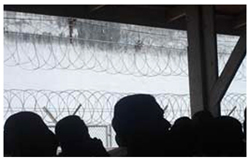High percentage of cases dismissed by the court in deep South a cause of serious concern
 By the News Desk
By the News Desk
The efficiency of police and public prosecutors in the strife-torn far South is being questioned after a high number of security-related cases brought to the court have been dismissed.
Since Jan 4, 2004 which marked the beginning of insurgency campaign staged by a new breed of insurgents, a total of 7,004 security-related cases have been recorded. Of these, 1,388 cases have been submitted to the public prosecution for consideration, but only 562 cases were actually lodged with the court. Of these, the court managed to deliver verdicts on 216 cases with the rest still pending consideration. Of the 216 cases already judged by the court, 86 of them were dismissed representing 40 percent which is regarded as rather high compared to just .02 percent of dismissed cases in Japan.
But the number of cases being dismissed by the court last year seems to be more disturbing. According to the Region 9 Office of the Judiciary which oversees the Narathiwat, Nathawee, Betong, Pattani, Yala, Songkhla, Narathiwat and Satun provincial courts, a total of 190 cases were lodged with the court last year. Of these, judgements were passed on 23 cases with five of them convicted and the rest dismissed. Three cases were also dropped.
Mr Niphon Boonyamanee, Democrat MP of Songkhla and vice chair of the House Budget Management Follow-up Committee, admitted that the high percentage of cases being dismissed by the court is a matter of serious concern. The dismissals stemmed from two possible factors: firstly, the defendants may be just scapegoats or were framed by the police and, secondly, insufficient evidences to convince the court to convict the defendants.
In order to solve the problem of the dismissed cases, the Democrat MP suggested that police and public prosecutors must make sure that they have sufficient evidences to back up their cases if they are to be filed with the court. Scientific tools such as CCTV will be helpful in providing additional evidences to strengthen cases, he added.
Mr Niphon then floated the idea of invoking Article 21 of the National Security Act to deal with suspects on security-related charges against whom incriminating evidences are insufficient.
The article, in essence, empowers a public prosecutor, with the consent of the director of the Internal Security Operations Command, to ask the court to remand a suspected insurgent who voluntarily surrenders for reeducation of not more than six months instead of prosecution.
The Democrat MP disclosed that Prime Minister Abhisit Vejjajiva had wanted Article 21 to be put on trial in Jana, Na Thawee, Thepa and Sabayoi districts of Songkhla where martial law had been lifted and replaced by National Security Act. He believes that the article will help convince suspected insurgents or the sympathizers to convert and to cooperate with the authorities.
Before Article 21 can be invoked, Mr Niphon noted that it is necessary that the military must work with the judiciary to first identify criminal offences which are to be covered by the law.
